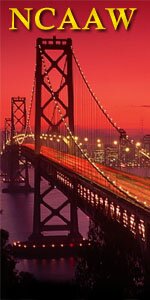
|
For contest entry include: 1. Cover letter with philosophy of substance abuse prevention approach 2. One-page executive summary of program 3. Goals and objectives 4. Planning time line and List and description of events before, during and after NCAAW 5. Publicity samples (e.g., posters, ads in papers, buttons, articles, etc.) 6. Budget 7. Funding Sources 8. Who planned/committee 9. Who attended 10. Special publications 11. Photo/Videos of events 12. Results/program significance in short term, long term 13. Two letters of reference from campus and/or community officials not directly involved in your program 14. Miscellaneous support items |
Apply for Recognition:
Get noticed for your NCAAW efforts
Make Your NCAAW an Award Winner!
With the evaluation of NCAAW done, it is time to sit back and relax - right? Wrong! If you and your NCAAW committees went to all of the trouble and work to develop a comprehensive set of activities for National Collegiate Alcohol Awareness Week and year-round programs, you deserve a chance for some national recognition.
Each year the Task Force sponsors an awards program for those schools participating in NCAAW as part of their year round alcohol and drug abuse prevention efforts. This competition includes not only national recognition, but cash awards as well. The best part of the deal is that if you follow the steps in this manual, much of your work is already done.
As a follow-up to your evaluation efforts, create a written report that outlines all activities and documents that were accomplished throughout the academic year. Compiled in a three-ring notebook form, this will be an extremely valuable tool for planning NCAAW the following year. Be sure to include samples of artwork, promotional materials, committee minutes and evaluation summaries. Develop sections that cover the major steps. This way not only have you created a permanent record of your efforts, but you can easily show off your efforts to administrators, potential funders and as a recruitment tool for future committee members.
The next step is to take this information and apply for recognition.
AWARD CRITERIA
Prizes will be awarded to the ten institutions that score highest based on the evaluation criteria listed below. Each award-winning institution will receive a $1,000 grant and a plaque commemorating its achievement. In addition, a scholarship of $1,000 will be presented to a community-based commuter institution.
JUDGING CRITERIA
Entries will be judged for their impact on year-long alcohol education programming. Please keep this emphasis in mind as you complete your NCAAW activities for the 2000-2001 academic year. Institutions will be judged in four major areas:
Foundations for Year-long Programming - 5 points
Were NCAAW activities a springboard for a coordinated and systematic year-long program? For example, are there current plans to address abusive behavior concerns in relationship to sporting events, academic performance, winter break, drinking and driving, spring break, wellness activities, stress management, graduation, new student orientation, student organizations, etc.?Variety and Creativity of Activities - 5 points
Does your program involve prevention (education), intervention (peer counseling, mentor programs) or referral components? Describe each activity and the process used to motivate involvement in its planning and implementation. Were the activities innovative?Breadth of Participation - 5 points
Who was invited to participate in NCAAW, and who actually participated? Were students, faculty, staff administrators, parents, alumni, and members of the local community involved in some way? Does your program reach beyond the campus community (e.g., local high school?)Evaluation - 5 points
What impact did your NCAAW have? Did members of the university community evaluate the role of alcohol misuse in their lives? Give specific examples of how students on your campus are making safer decisions about abusive behavior and how you evaluated your results. What additional programs or information would interest participants during the rest of the year? Is this information available in summary form?
DEADLINES
Submit the information outlined above, along with appropriate support material, by May 1, 2001 to:
National Collegiate Alcohol Awareness Week
c/o Dr. Herbert Songer
Vice President for Student Affairs
Fort Hays State University
600 Park St.
Hays, Kansas 67601-4099
PH: (785) 628-4277
FAX: (785) 628-4113
E-mail
Submitted applications become property of the Inter-Association Task Force on Campus Alcohol and Other Substance Abuse Issues and will not be returned unless specific arrangements are made ahead of time.
Decisions will be made and winners notified by July 1, 2001.
- BACK -